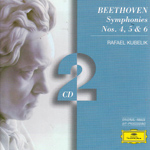DG continues its protracted CD release of Rafael Kubelik’s 1970s Beethoven Symphony cycle–a series unique for its use of nine different orchestras from Europe and the United States. As with the first volume containing Symphonies Nos. 7-9 (type Q1319 in Search Reviews) Kubelik maintains a remarkable consistency of performance style despite the differing character of the various ensembles. He renders Beethoven in the time-honored grand manner, with rich orchestral sonorities and well chosen, primarily moderate tempos. But don’t mistake “moderate” for “so-so”, as Kubelik generates much energy in his justly-paced Fourth, where he displays a commanding grasp of the music’s harmonic drama and rhythmic dynamism. The Israel Philharmonic does its part by providing rhythmically alert, keenly articulated playing (listen to the strings’ rapid runs in the finale).
In Symphony No. 5 Kubelik pays equal attention to the music’s vertical and horizontal dimensions, making this performance particularly rich in color and ambiance even as he employs “standard” tempos–that is, tempos noticeably slower than today’s period-practice norms. While it can’t be numbered among the most gripping performances on disc, the Boston Symphony’s storied virtuosity, ensemble balance, and overall smoothness of sound make this decidedly “old world” Fifth (Kubelik opts for the horn in the first-movement recapitulation) eminently enjoyable–certainly more interesting than the BSO’s rather bland run-through with Ozawa a decade later.
The gem of this set, however, is Kubelik’s big-hearted and beautifully rendered Pastoral, featuring a surprisingly full-toned Orchestre de Paris. The Parisians seem to have wanted to prove their mettle in Beethoven, and they do so in spades here, providing an irresistibly sumptuous orchestral timbre that matches Kubelik’s gentle yet vibrant conception. The ensemble balance is simply remarkable, allowing virtually every individual instrumental line (particularly Beethoven’s marvelous woodwind writing) to emerge clearly–listen to how Kubelik magnifies the left/right string interplay atop the dancing horns in the scherzo just before the oboe solo. So enchanting is the atmosphere that you regret Kubelik’s cutting the first-movement exposition repeat (the only time in this present set he does so), and you scarcely notice time passing during his unusually spacious account of the Scene by the Brook (which clocks in at more than 14 minutes). My only complaint is that he doesn’t really let the finale’s climax achieve its full impact (as in Bernstein’s rapturous Vienna performance). But that’s a minor point, for this is an essential Pastoral, especially since DG’s engineers have managed to bring a surprising warmth to Paris’ Salle Wagram. The Israel Philharmonic sessions were done in Munich’s spacious Hercules Hall, while the Boston Symphony recording offers the richest, most realistic sound.
































